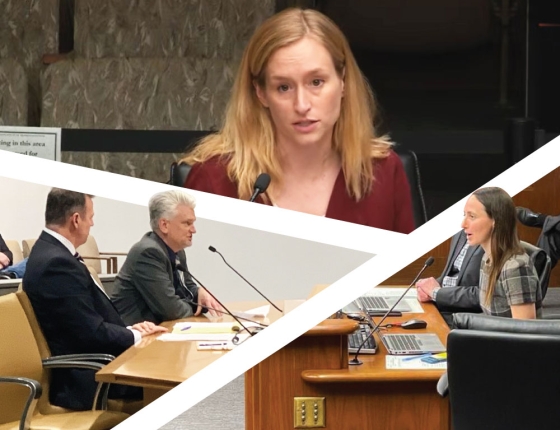The 2023 Minnesota legislative session proved monumental for securing clean energy wins that will benefit Minnesotans all across the state and pave the way for the state to meet its ambitious greenhouse gas reduction goals. This year, the Minnesota House and Senate passed a record number of innovative energy policies to advance the clean energy transition in Minnesota and maximize utilities, residents, and businesses’ ability to benefit from federal incentive programs, like the Infrastructure Investment and Jobs Act (IIJA) and Inflation Reduction Act (IRA).
Innovative initiatives
Below are just a few of the clean energy policies that CEE supported this session.
IIJA Funding (Competitiveness Matching Grants) – This session, Minnesota legislators allocated a total of $190 million of state funding for IIJA competitiveness matching grants and technical assistance. This funding will be used to compete for and draw down federal funding available through the IIJA for clean energy infrastructure investments, including much-needed new electric transmission projects. CEE is proud to have supported this legislation through a large coalition that included utilities, Labor, and environmental groups. This state funding will unlock opportunities to leverage federal dollars to modernize Minnesota’s energy system. Read the bill here.
100% by 2040 – This new law will require that 100% of the electricity that Minnesota utilities produce or buy be generated with carbon-free energy resources by 2040. The law includes a process to consider and maintain reliability and affordability; to consider the impact of new, beneficial electric loads on the energy system; and to track job impacts and support workers. The bill passed and was signed into law by Governor Walz in February. This law is foundational for meeting our state’s climate goals and we look forward to supporting its implementation. Read the bill here.
Heat Pumps – Representative Patty Acomb and Senator Jennifer McEwen authored a state heat pump rebate program to support federal IRA incentives and encourage Minnesota homeowners to insulate their homes when installing a heat pump for space heating. Pairing improved insulation with a new air source heat pump helps contain costs, while maximizing the efficacy of the heat pump system. This legislation includes two additional components to complement the rebates, a statewide energy coordinator and contractor training programs. These programs will help educate Minnesotans on the clean energy incentives available to them at the utility, state, and federal level and train contractors on heat pump technologies to help promote their adoption further. Read the bill here (pages 297.25, 308.21, and 404.17).
Low-Income ECO Definition Clarification – The Minnesota House and Senate passed legislation to expand access to energy efficiency services for low-income households through utilities' Energy Conservation and Optimization (“ECO”) programs. During pre-session discussions with utilities, it became clear that the 2021 definition of “low-income household” included in the new ECO program was too restrictive and would limit access to efficiency services for many families in-need. CEE partnered with the Energy CENTS Coalition and the Department of Commerce to develop language to increase access to low-income energy efficiency services by raising the income eligibility threshold and reducing the administrative burden to verify and document eligibility. This policy change will also align income eligibility with IRA incentives, allowing utilities to leverage additional federal funding to serve more low-income Minnesotans. Read the bill here (page 352.15).
Benchmarking – Representative Larry Kraft and Senator Mitchell authored legislation to require large buildings in Minnesota to benchmark their energy consumption. This will allow building owners and operators to identify and implement opportunities for energy efficiency by comparing energy consumption across similar buildings. It also requires utilities to provide data tools to their customers that enable benchmarking, while protecting privacy. Finally, the bill provides funding for the administration of the program and grants to munis to implement and BOMA to train building engineers on the new requirements. CEE worked with a broad coalition of stakeholders, including large power customers, co-op utilities, clean energy organizations, and other building experts, to refine and support this important policy. Read the bill here (pages 296.4 and 367.7).
Commercial codes adoption – CEE worked with the Department of Labor and Industry and stakeholders to craft language to advance commercial building codes. The policy will allow the state to adopt the latest ASHRAE commercial energy codes and created a new goal of an 80% reduction in annual net energy consumption to drive energy efficiency in our commercial buildings. Read the bill here (page 18.16).
Minnesota's on a roll
In addition to these clean energy wins, a number of other important clean energy initiatives passed this year:
- Host Community Transition Grants (page 145.25)
- Minnesota Climate Innovation Finance Authority (Green Bank) (page 257.8)
- Pre-weatherization and Workforce Training (pages 293.4 and 364.12)
- Minnesota Energy Alley (page 294.10)
- Electric Grid Resiliency Grants (page 427.13)
- High-voltage Transmission Line to North Dakota (page 293.15)
- Local Climate Action Grants (page 423.9)
A bright future for all Minnesotans
CEE believes these investments in our electric grid, buildings, energy efficiency, and workforce will propel Minnesota toward a resilient, reliable clean energy future with economic and environmental benefits for all. In addition to passing transformative energy policy, CEE appreciates that both the House and Senate recognized the additional responsibilities placed upon the Department of Commerce, Division of Energy Resources and the Minnesota Public Utilities Commission and granted them their requested operating budget increases. These two entities will develop and implement more programing than ever before with the passage of 100% Carbon Free by 2040, Infrastructure Investment and Jobs Act, and Inflation Reduction Act. CEE is proud to be part of that vital work, now and for many years to come.
